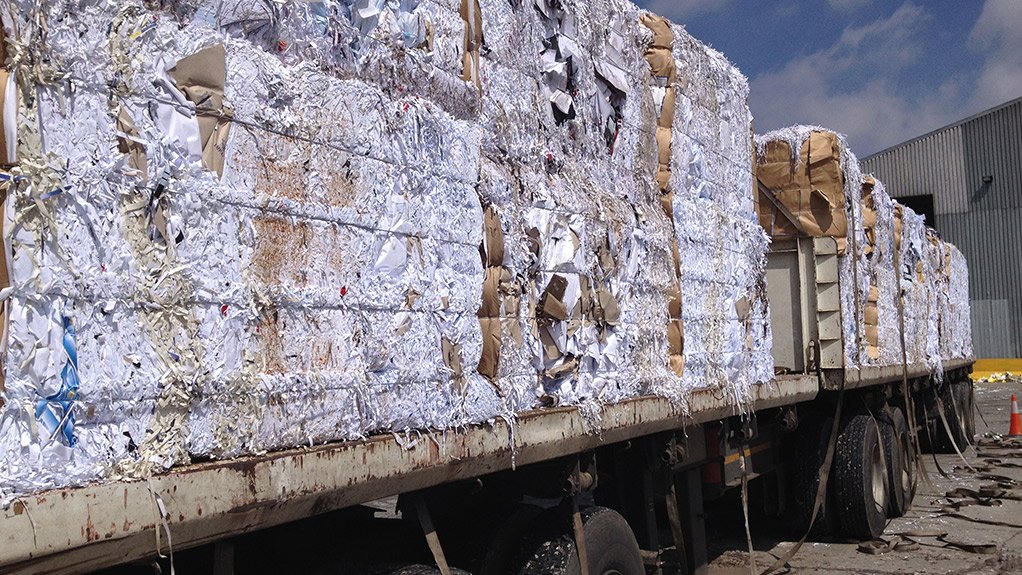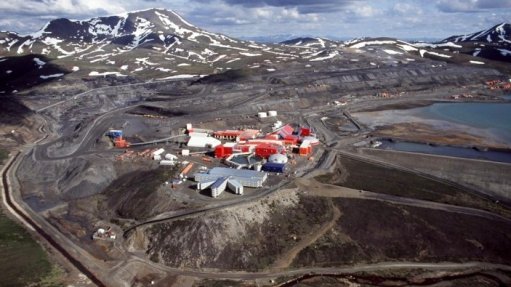Paper, pulp and board industry will grow



JANE MOLONY Those industries that can support environmental sustainability through product offerings have a good chance of withstanding disruption, and perhaps causing some themselves
PAPER BALES Pamsa drives paper recovery through its recycling arm, RecyclePaperZA
The Paper Manufacturers Association of South Africa (Pamsa) is optimistic that the paper, pulp and board industry is sustainable and will continue to provide South Africa with several paper products, says Pamsa executive director Jane Molony.
She also notes that, while the industry has had to deal with disruption, it is also doing some disrupting itself.
She tells Engineering News that, over the past ten years, demand for and consumption of printing and writing paper grades have declined, owing to digitised information storage and the move towards electronic media. Packaging, however, is less susceptible to disruption by the Internet.
There is some convergence that benefits the sector, Molony notes – as online shopping increases, so does the need for lightweight, sustainable packaging, in the form of cardboard boxes, which are reusable and recyclable.
The tissue sector is becoming increasingly competitive, as manufacturers want to make the product softer while keeping its strength. Owing to a poor economic outlook, however, local consumption has not kept pace with the additional capacity that has come online during the past two years, and an increase in tissue exports has been observed, she points out.
One of the major challenges facing the industry is the digital age. “People don’t wait for the newspaper to look for a job – they go online. If they are looking for the weekend’s sporting events, there are several sites offering this information. Social media fulfils our hunger for news,” she comments.
However, Molony says, although print has declined, it is not “dead”. Community newspapers and a few mainstream publications continue to flourish.
“We are well into the age of technology, living an ‘always-on, always-connected’ lifestyle. With this comes the need to ‘unplug’ – a paper book or a Sunday newspaper offers this respite. Just as we still have bicycles among motor vehicles and pencils in our pen holder, paper will always be close to our computers and smartphones.”
While trends are pointing to resurgence of the paper book, paper makers have had to diversify – in the form of speciality packaging and innovative, functional bioproducts from wood fibre – to stay in business.
Cellulose can be used to make smartphone screens, as filler in cosmetics and as biomaterials that replace fossil fuel derivatives in many applications, she advances.
Moreover, renewability is at the heart of the industry, with wood being derived from farmed trees.
“Those industries that can support environmental sustainability through product offerings have a good chance of withstanding disruption, and perhaps causing some themselves.”
Meanwhile, Molony says the biggest potential for growth in the forest products sector lies in using wood for construction, lignocellulosic low-carbon and greener alternatives instead of plastic, as well as the beneficiation of waste streams from the value chain.
Through its process research unit and its master of engineering bursary programme, Pamsa has several research projects, including studying the valorisation of waste streams from the papermaking processes and extraction of bio oils, under way.
Meanwhile, Pamsa drives paper recovery through its recycling arm, RecyclePaperZA, and is constantly considering ways of increasing recycling rates, trying to ensure that the environment for doing business in South Africa improves every year.
Regulatory and policy uncertainty are countered through constant engagement with government to come to mutually beneficial solutions.
Further, the forestry and forest products industry recently committed to investments of R18-billion at the Public-Private Growth Initiative meeting, held with President Cyril Ramaphosa in January at the Gallagher Convention Centre, in Midrand.
“However, it is imperative that we plant more trees to make these investments possible. We are hopeful that large carbon dioxide (CO2) emitters will be able to offset their emissions by planting or supporting smallholder tree farmers. “This would assist the industry in providing new fibre, the country in sequestering CO2 while the trees are growing and, later, in producing the wood and paper products,” Molony concludes.
Article Enquiry
Email Article
Save Article
Feedback
To advertise email advertising@creamermedia.co.za or click here
Announcements
What's On
Subscribe to improve your user experience...
Option 1 (equivalent of R125 a month):
Receive a weekly copy of Creamer Media's Engineering News & Mining Weekly magazine
(print copy for those in South Africa and e-magazine for those outside of South Africa)
Receive daily email newsletters
Access to full search results
Access archive of magazine back copies
Access to Projects in Progress
Access to ONE Research Report of your choice in PDF format
Option 2 (equivalent of R375 a month):
All benefits from Option 1
PLUS
Access to Creamer Media's Research Channel Africa for ALL Research Reports, in PDF format, on various industrial and mining sectors
including Electricity; Water; Energy Transition; Hydrogen; Roads, Rail and Ports; Coal; Gold; Platinum; Battery Metals; etc.
Already a subscriber?
Forgotten your password?
Receive weekly copy of Creamer Media's Engineering News & Mining Weekly magazine (print copy for those in South Africa and e-magazine for those outside of South Africa)
➕
Recieve daily email newsletters
➕
Access to full search results
➕
Access archive of magazine back copies
➕
Access to Projects in Progress
➕
Access to ONE Research Report of your choice in PDF format
RESEARCH CHANNEL AFRICA
R4500 (equivalent of R375 a month)
SUBSCRIBEAll benefits from Option 1
➕
Access to Creamer Media's Research Channel Africa for ALL Research Reports on various industrial and mining sectors, in PDF format, including on:
Electricity
➕
Water
➕
Energy Transition
➕
Hydrogen
➕
Roads, Rail and Ports
➕
Coal
➕
Gold
➕
Platinum
➕
Battery Metals
➕
etc.
Receive all benefits from Option 1 or Option 2 delivered to numerous people at your company
➕
Multiple User names and Passwords for simultaneous log-ins
➕
Intranet integration access to all in your organisation




















